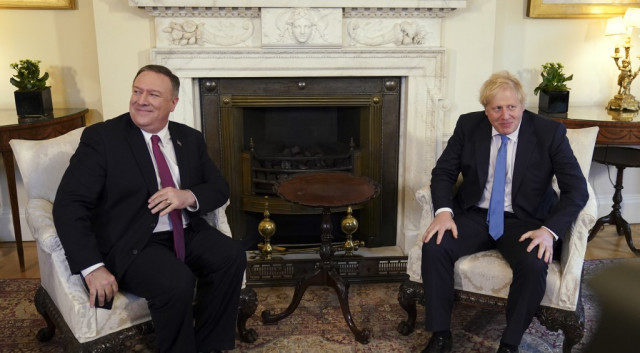Visiting US Secretary of State Mike Pompeo on Tuesday met Prime Minister Boris Johnson in a bid to pull Britain ever closer in Washington’s diplomatic tug-of-war with China.
The top US diplomat will also meet Foreign Secretary Dominic Raab and a hawkish faction of the ruling Conservative party that wants Beijing punished for its treatment of Hong Kong and persecution of more than one million ethnic Uighurs and other mostly Muslim minorities.
“Social distance does not imply diplomatic or political distance,” Johnson joked as he walked Pompeo into his office in Downing Street.
Pompeo’s last visit to London in January came just days after Johnson ignored Washington’s warnings and allowed China’s tech giant Huawei to help roll out Britain’s 5G network.
It was a frosty affair that saw Pompeo accuse Britain of endangering Western intelligence-sharing by putting China at the heart of its next-generation data system.
Britain’s relationship with China was then blooming as Johnson sought lucrative partners that could fill the void left by the UK’s exit in January from the European Union.
But the months that followed have seen Britain increasingly share the view within US President Donald Trump’s administration that China was a global threat.
Johnson’s most dramatic policy reversal saw him order UK mobile providers to stop buying 5G equipment from Huawei starting next year and remove existing gear by 2027.
Pompeo congratulated Johnson for getting “the complete right end of the stick on this one.”
The Chinese foreign ministry responded by accusing Britain of becoming “America’s dupe”.
The range of steps taken by Johnson in the past month threaten to bring an early end to a “golden decade” in cooperation that former British finance minister George Osborne promised on a visit to Beijing in 2015.
London has also outraged Beijing by offering nearly three million residents of Hong Kong a pathway to UK citizenship in response to a highly controversial security law that China imposed on the former British colony last month.
Britain followed that up on Monday by suspending its extradition treaty with Hong Kong and extending an arms embargo of “potentially lethal weapons” that had previously applied only to mainland China.
Unpopular president
Pompeo’s visit will include a sideline meeting with exiled Hong Kong protest leader Nathan Law aimed at further stressing the seeming new understanding about Beijing.
Yet some tensions between London and Washington remain.
Johnson is keen to avoid being too closely associated with Trump — whose approval in Britain is languishing at around 20 percent — despite the “special relationship” between the two historical allies.
The UK government stresses that it only ditched Huawei after new US sanctions imposed in May threatened the safety of future 5G equipment produced in China.
But Pompeo said he did not think US sanctions had played a role.
“You suggested they did this because of US sanctions. I don’t actually think that’s true,” he told reporters last week.
“I actually think they did this because their security teams came to the same conclusion that ours have, is that you can’t protect this information.”
Washington argues that the Chinese Community Party can force Huawei to either intercept UK data or shut down the British network in times of war.
Huawei has always denied this was the case.
The UK parliament’s release of a delayed report that took the government to task for failing to properly look into any Russian meddling in the 2016 Brexit referendum also threatens to complicate Pompeo’s trip.
The report was commissioned in response to concerns that Moscow attempted to help Trump win the presidency in 2016.
Trump and Pompeo reject suggestions that Russia played any meaningful role in the vote.
Meanwhile Tuesday, US Defense Secretary Mark Esper said he plans to visit China this year, as Washington takes a tougher stance against Beijing in the disputed South China Sea.








